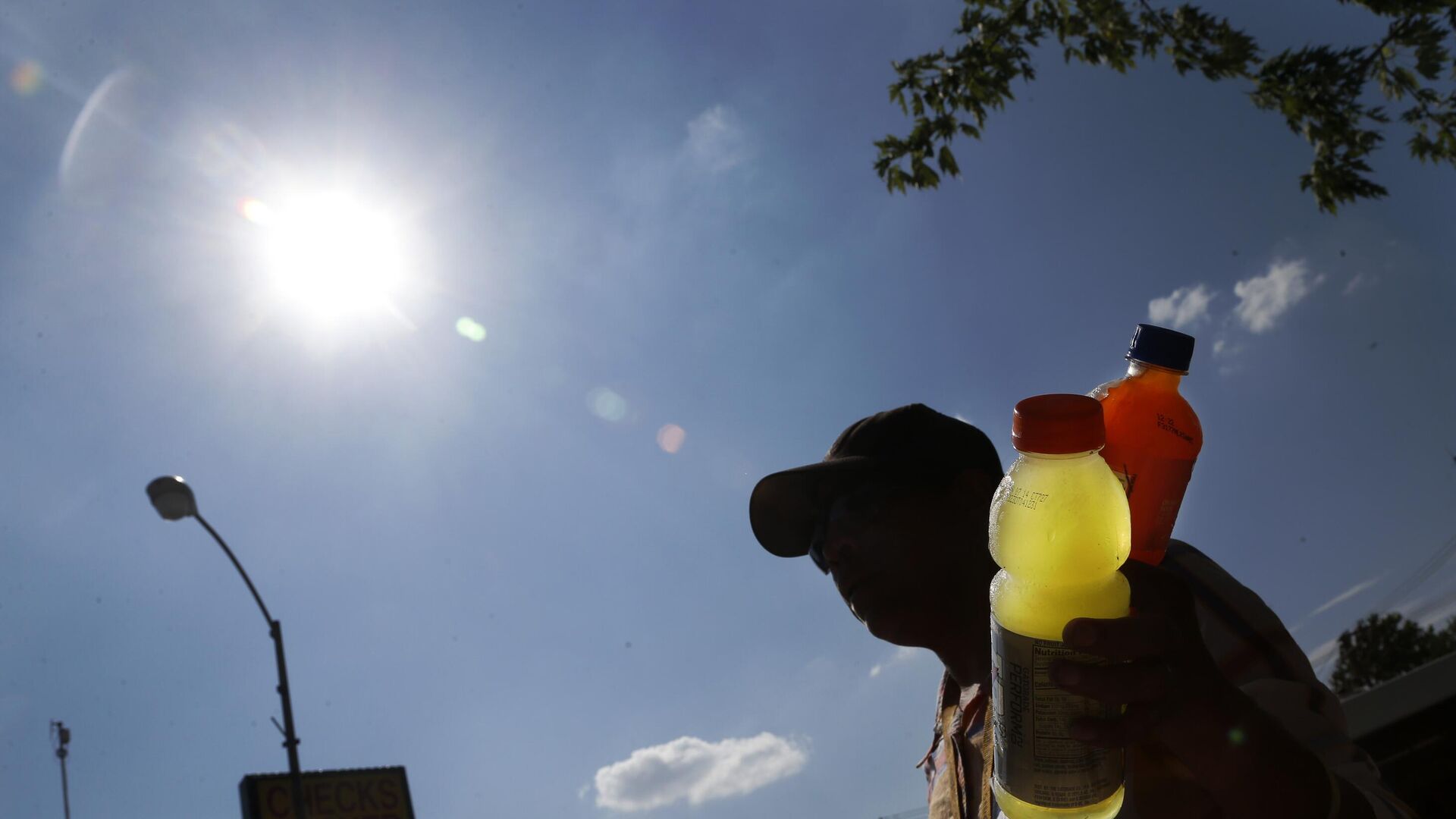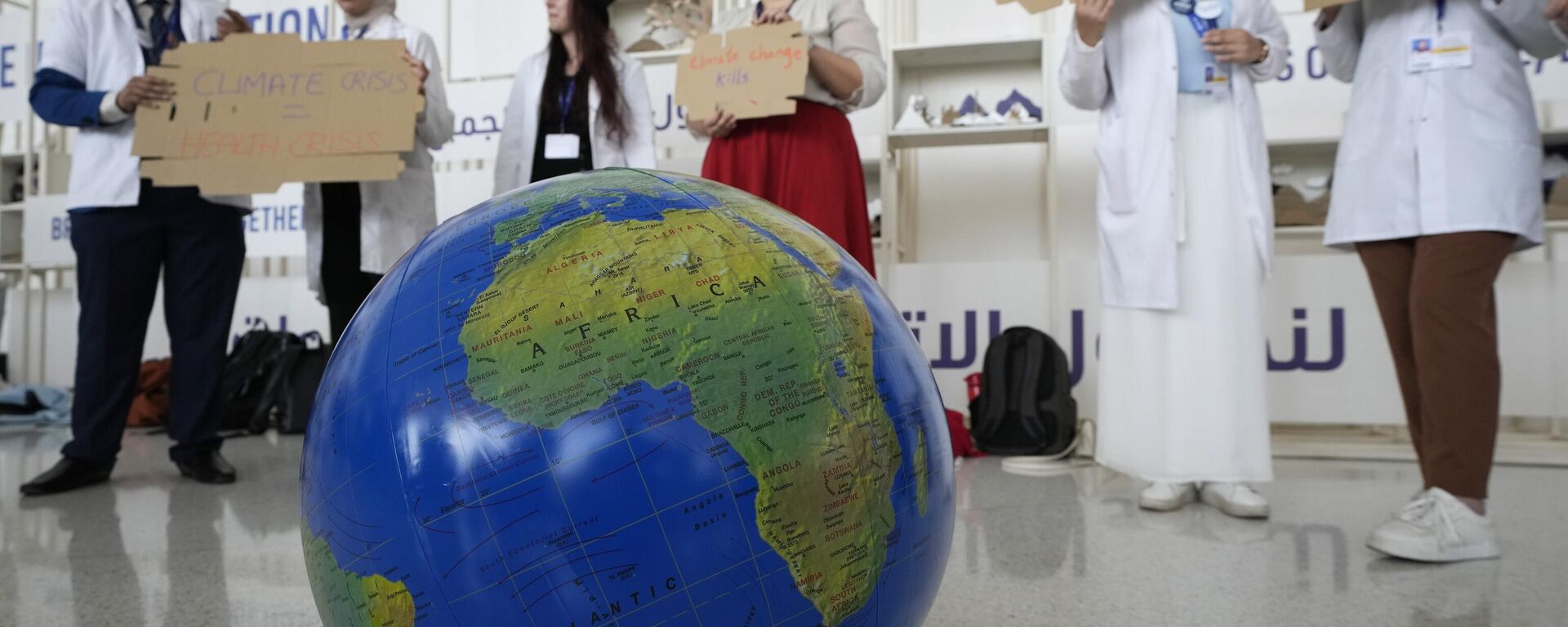https://en.sputniknews.africa/20231205/heatwaves-may-affect-up-to-28bln-people-worldwide-by-2090-un-migration-agency-says-1063968070.html
Heatwaves May Affect Up to 2.8Bln People Worldwide by 2090, UN Migration Agency Says
Heatwaves May Affect Up to 2.8Bln People Worldwide by 2090, UN Migration Agency Says
Sputnik Africa
MOSCOW (Sputnik) - The agency's prediction comes as high-level representatives from countries around the world and global organizations gather in Dubai, United... 05.12.2023, Sputnik Africa
2023-12-05T18:03+0100
2023-12-05T18:03+0100
2023-12-05T18:03+0100
united arab emirates (uae)
asia
international organization for migration (iom)
united nations (un)
climate
climate change
cop28 in uae
https://cdn1.img.sputniknews.africa/img/07e7/0c/05/1063968310_0:0:2922:1645_1920x0_80_0_0_992bb40358d0058d2fcd11d8bea30a8a.jpg
Up to 2.8 billion people worldwide could be exposed to heatwaves by 2090 under a high-warming scenario, implying a global temperature rise of 3–4 degrees Celsius (5.4-7.2 degrees Fahrenheit) by 2100, the International Organization for Migration (IOM) said on Tuesday. In addition, almost half of the people potentially exposed to heatwaves in the future are expected to live in Southern Asia, a region especially prone to climate-related displacements over the past decade, the organization said. Other risks associated with global warming include floods, droughts, crop failures, wildfires and tropical cyclones, it said. By 2090, up to 39 million people are projected to be exposed to river floods under the high-warming scenario, mostly in Sub-Saharan Africa, the IOM added. However, as climate change has already contributed significantly to migration worldwide, obtaining more precise data is crucial for taking action to minimize its consequences, he added.
https://en.sputniknews.africa/20231203/cop28-africa-must-come-to-climate-change-talks-as-strong-partner-professor-believes-1063931923.html
united arab emirates (uae)
asia
Sputnik Africa
feedback@sputniknews.com
+74956456601
MIA „Rossiya Segodnya“
2023
Sputnik Africa
feedback@sputniknews.com
+74956456601
MIA „Rossiya Segodnya“
News
en_EN
Sputnik Africa
feedback@sputniknews.com
+74956456601
MIA „Rossiya Segodnya“
Sputnik Africa
feedback@sputniknews.com
+74956456601
MIA „Rossiya Segodnya“
united arab emirates (uae), asia, international organization for migration (iom), united nations (un), climate, climate change, cop28 in uae
united arab emirates (uae), asia, international organization for migration (iom), united nations (un), climate, climate change, cop28 in uae
Heatwaves May Affect Up to 2.8Bln People Worldwide by 2090, UN Migration Agency Says
MOSCOW (Sputnik) - The agency's prediction comes as high-level representatives from countries around the world and global organizations gather in Dubai, United Arab Emirates, for the 28th United Nations Climate Change Conference (COP28) to discuss climate change and its solutions.
Up to 2.8 billion people worldwide could be exposed to heatwaves by 2090 under a
high-warming scenario, implying a global temperature rise of 3–4 degrees Celsius (5.4-7.2 degrees Fahrenheit) by 2100, the International Organization for Migration (IOM) said on Tuesday.
"Up to 2.8 billion people could be exposed to heatwaves by 2090 under a high-warming scenario, more than double that in a low-warming scenario [...] The low and high warming scenarios represent different future trajectories in greenhouse gas concentrations, leading to a global temperature rise of likely below 2°C and of 3–4°C by 2100, respectively," the IOM said.
In addition, almost half of the people potentially exposed to heatwaves in the future are expected to live in Southern Asia, a region especially prone to
climate-related displacements over the past decade, the organization said.
Other risks
associated with global warming include floods, droughts, crop failures, wildfires and tropical cyclones, it said. By 2090, up to 39 million people are projected to be exposed to river floods under the high-warming scenario, mostly in Sub-Saharan Africa, the IOM added.
"There is no consensus yet on how global human mobility will respond to the impacts of climate change," IOM data and research analyst Robert Beyer said.
However, as climate change has already contributed significantly to migration worldwide, obtaining more precise data is crucial for taking action to minimize its consequences, he added.


